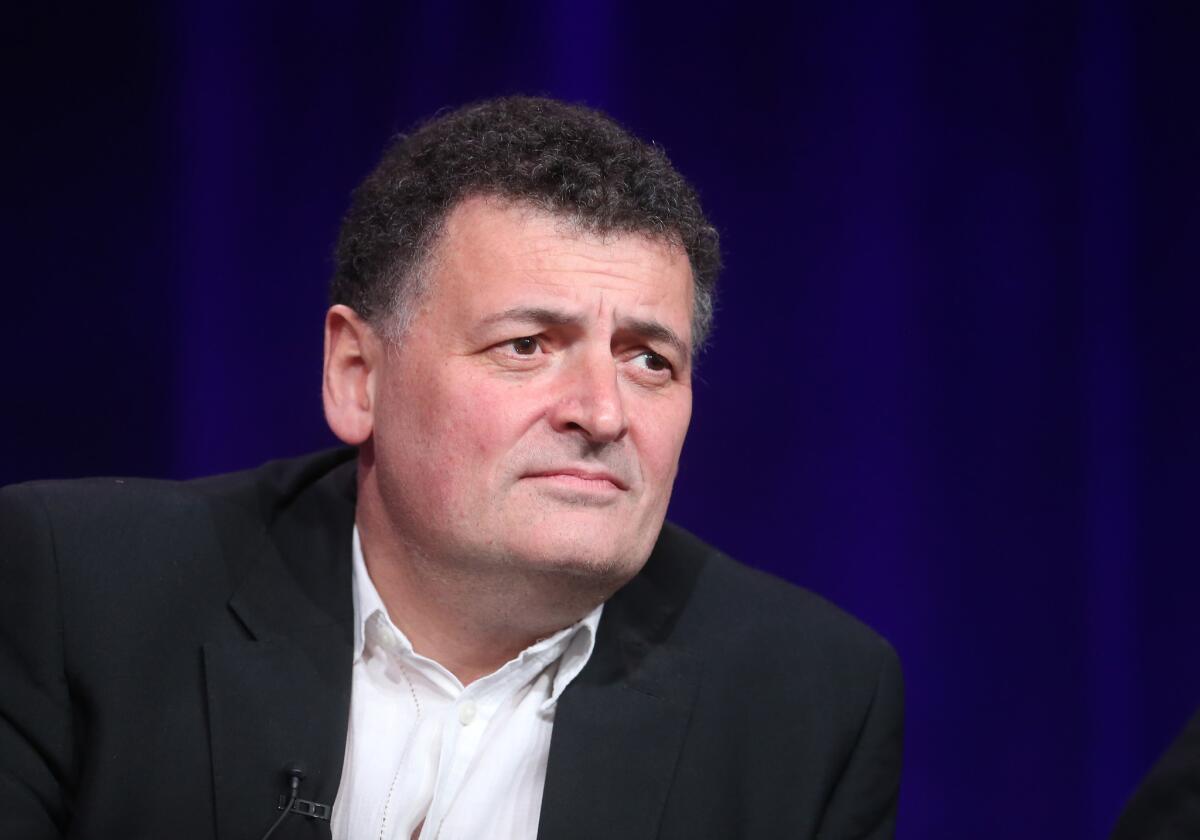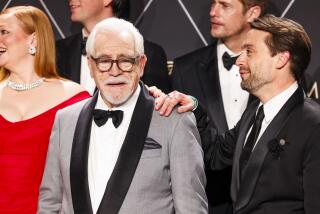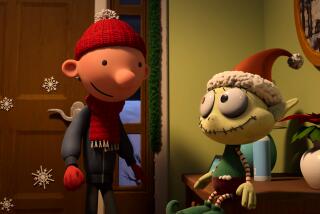Q&A: ‘Dr. Who’ head writer Steven Moffat has all the answers

Head writer Steven Moffat has been determining the course of “Doctor Who” since 2010, when show-runner Russell Davies handed over the keys to the TARDIS and Matt Smith took over from David Tennant as the dark and madcap traveler in time and space.
He has written five Christmas episodes for the Doctor, four for Smith and the latest, “Last Christmas,” for Peter Capaldi, the current inhabitant of the role. Earlier stories have made reference to Dickens (“A Christmas Carol,” 2010) and C.S. Lewis (“The Doctor, the Widow and the Wardrobe,” 2011); the new one includes Santa Claus and is set at the North Pole.
Last known companion Clara (Jenna Coleman) is again aboard. Nick Frost (“Shaun of the Dead,” “Hot Fuzz”) plays Santa. As is traditional, there is snow.
I spoke with Moffat, transatlantically, about “Doctor Who” at Christmas and other times.
Do you approach writing the Christmas specials with any special excitement?
Steven Moffat: I always approach “Doctor Who” with excitement. Otherwise, I wouldn’t still be doing it. I suppose there are extra challenges; what are we going to do to make it Christmas-y — all that stuff.
But in the end, the audience just wants to sit down and actually watch “Doctor Who.” They don’t want you just to turn it into a Christmas spectacular. And you have to keep in mind that some people are being forced to watch it that don’t normally watch it, ‘cause it’s a big family event.
And you know what’s like about 6 o’clock on Christmas Day — you can hardly keep your eyes open, you’ve been stuffing your face, you’ve been drinking champagne since 10 in the morning. It’s the most highly sugared day of the year, so maybe it’s not the time for the most intricately plotted piece of “Doctor Who” you’ve ever done. It’s time to make it quite accessible and appropriate to the day. And it’s got to have a big heart, and it’s got to be a bit sentimental. But then “Doctor Who” always has those things.
Both David Tennant’s first full episode as the 10th and Matt Smith’s last as the 11th fell on Christmas.
Those are just things that come up in the cycle of the show. For logistical reasons, it was the right time for Matt to leave and the right time for David to leave. I’m not that in favor of killing off a children’s hero on Christmas Day.
How did you decide to use Santa Claus?
It just came up as a fun idea. In Britain, Doctor Who and Santa Claus are the two big heroes at Christmas, so for them to share an adventure, just the visual of Father Christmas entering the TARDIS, is kind of cool.
Was it different writing a Christmas episode for Peter Capaldi? His Doctor is a bit grumpier than Matt Smith’s was.
Matt’s could be quite grumpy at Christmas too. On paper, the Doctor never changes that much — it’s the different performance. Matt Smith’s Doctor was mostly cheery with a grumpy man underneath, and Capaldi’s is more like a grumpy man with a cheery man underneath; but, oddly, the experience of writing a Doctor doesn’t change that radically. He’s the same man; he’s just got a different face and a slightly different mood.
So you’re writing the same character.
Very much so. It’s a different version He’s changed a lot, but you don’t want to think that Matt Smith’s Doctor just died; you want to think that he’s reborn as somebody else. And you know, you’ve been reborn too: You’re not the same as you were when you were a teenager or a toddler. You’re not the same at work as you are at home. We all change. When it comes right down to it, of course, he’s exactly the same; at his heart he’s the same man.
Does canonicity matter to you?
Well, yes, provided you’re prepared to embrace that some of these adventures happen twice and there are massive contradictions. But why shouldn’t there be? As I once said, you can’t really have continuity errors in a show that embraces the idea of changing history and parallel histories; you can enjoy all of “Doctor Who” if you want. And I kind of think you should. I think everything’s canonical. Why not just say it all happened? Some of it happened twice. Sometimes he was human, sometimes he was a Time Lord. Who cares? You’re allowed. Everything is equally fictional; it’s a kind of nonsense to say otherwise.
Does it matter whether the timelines are logically correct, or just that they’re poetically right?
All the rules of that kind of thing on “Doctor Who” are dramatic and, as you say, poetic rather than scientific or mathematical, because that’s the kind of show it is. You sort of set up the world with every episode, and you stick to the rules of that episode; sometimes you break them elsewhere. But that’s not how people watch “Doctor Who.” In modern “Doctor Who,” the British prime minister shot dead the American president on television — and no one ever referred to it again. I think if it actually happened that would be mentioned quite a lot. It would cause a moment of unease between the nations.
More to Read
The complete guide to home viewing
Get Screen Gab for everything about the TV shows and streaming movies everyone’s talking about.
You may occasionally receive promotional content from the Los Angeles Times.







